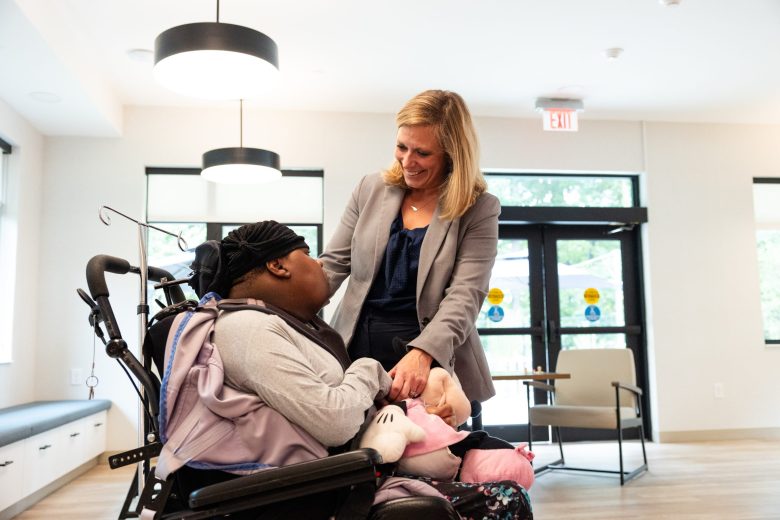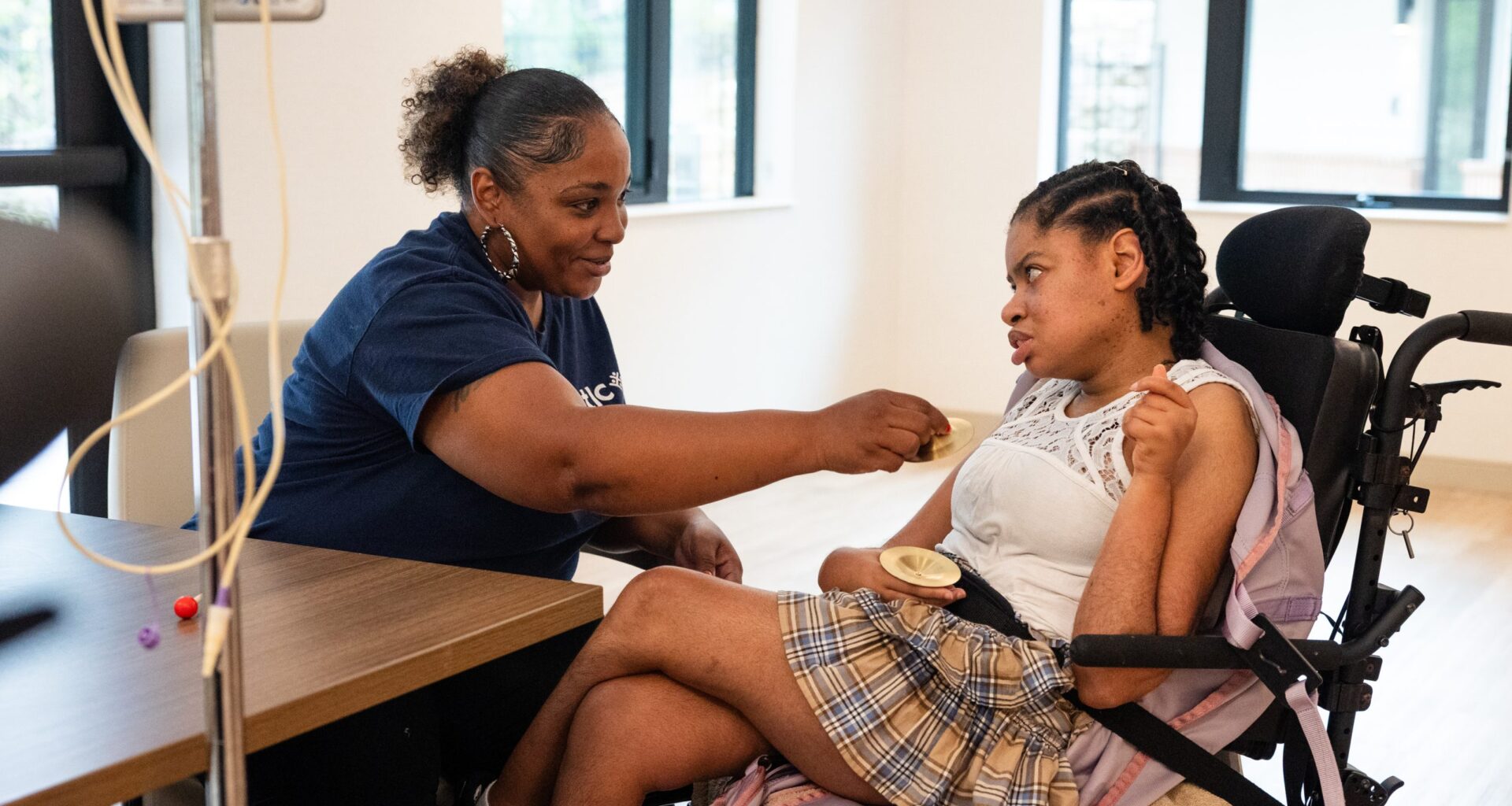By Jaymie Baxley
Jennifer Shigley can’t speak or walk without assistance.
The 49-year-old also cannot feed or bathe herself. Her father, a retired child psychologist, described her as having the mental capacity of a toddler.
“She requires total care,” Hal Shigley said. “Thank goodness she is in a facility where she’s taken good care of.”
For eight years, Jennifer has lived at a group home operated by the Raleigh nonprofit TLC — formerly known as the Tammy Lynn Center — for adults with intellectual and developmental disabilities. Like other residents of the facility, her around-the-clock care is made possible by North Carolina’s Medicaid program.
“It’s very expensive to care for people like Jennifer and people who have similar disabilities,” said Hal Shigley, who estimated that the government-funded health insurance program pays “somewhere in the neighborhood” of $150,000 a year for his daughter to stay at TLC.
Jennifer’s benefits shouldn’t be affected by looming federal cuts to Medicaid because she’s in a special coverage category for people with profound intellectual and developmental disabilities.
But advocates are warning that the Trump administration’s proposals to slash Medicaid — a program where states and the federal government each shoulder part of the costs — by up to $2.3 trillion over the next decade could end up jeopardizing the kind of care she receives.
Strain on the system
Sarah Crawford, a Democratic member of the N.C. House of Representatives, has a stake in the issue: She’s CEO of TLC.
Crawford said the 30 adults who live at the organization’s three group homes for people with “severe and profound needs” require 24-hour personal care, with “99 percent of their medical treatment” provided on site. The average annual cost of that care, she said, is about $230,000 per person.
Without Medicaid, Crawford said it would be “nearly impossible for the majority of families to pick up the tab.”
“These are families that rely on TLC,” she said. “There are folks that have lived with us for 30 years. This is their home. This is where they live and live life to the fullest.”
The Trump administration has not proposed eliminating or limiting Medicaid benefits for participants with intellectual or developmental disabilities. People with disabilities are among the few groups exempt from a new rule, set to take effect in December 2026, that requires enrollees to prove they are working, attending school or volunteering for at least 80 hours a month.
But Crawford fears the work requirement and other sweeping changes laid out in the One Big Beautiful Bill Act signed into law on July 4 will nonetheless have downstream implications for organizations like TLC.
 Sarah Crawford, CEO of Raleigh nonprofit TLC, has served in the N.C. House of Representatives since 2023.
Sarah Crawford, CEO of Raleigh nonprofit TLC, has served in the N.C. House of Representatives since 2023.
Credit: Kelly Hudgins/Light Creative
Jay Ludlam, head of Medicaid for North Carolina, has said that implementing the work requirement will force the state to develop a costly, complex new platform to check beneficiaries’ employment status.
The OBBBA does not provide the state with any federal funding to create that platform. In fact, it limits North Carolina’s ability to offset the work requirement’s cost because the new law reduces the amount of taxes the state can impose on providers.
North Carolina currently collects a 6 percent tax on providers’ net revenue from patients. The new law lowers the rate to 3.5 percent. Having that lower tax rate means that the state cannot draw down as much federal matching money for Medicaid.
Medicaid is such a large program that even a change of 1 percent can end up equating to hundreds of millions of dollars. Ludlam said the provider tax rate cap will likely result in billions of dollars in lost funding for the state.
Crawford said those reductions could leave facilities like TLC struggling to stretch already thin resources. “If we lose funding, it will be harder for us to provide that care because we will have to do the same amount with less,” she said.
“As the Medicaid system gets stressed and strained because of less money being available in that pie, we are concerned about the impact to the services that we provide,” she added. “If the systems get strained in a way that Medicaid can no longer fund those services, it would be very, very difficult for families to provide those services.”
A broader reckoning
Corye Dunn, director of public policy for Disability Rights North Carolina, said it would be a mistake to assume the cuts won’t touch people with disabilities just because their coverage isn’t in the crosshairs.
“There is no way to make the massive cuts the federal government has made without hurting people with disabilities,” Dunn said. “We are disproportionately reliant on Medicaid, even when we have private insurance because so many of the services people with disabilities need are not covered, traditionally, with private insurance.”
She worries that the cuts will result in rate reductions that would worsen North Carolina’s shortage of direct support professionals — the workers who feed, bathe and help residents with daily needs. Many already earn poverty-level wages, and turnover is rampant.
“Anytime there’s a threat to rates, it’s really a threat to staff salaries,” Dunn said. “People leave the field if they can’t make enough money to live. You wind up with a less stable and overall lower-quality pool of staff available to people with disabilities when you threaten rates. That’s just as true in a group home as it is in an intermediate care facility.”
Beyond staffing, Dunn said cuts could ripple across every part of a facility’s operations, from food budgets to building upkeep.
“Rates affect everything,” she said. “They affect how much we can staff, the quality of food that is served, the health and safety. There is not a single thing that rates don’t impact, and we do not yet know how this will affect rates.”
Hal Shigley knows some lawmakers may balk at how much it costs to care for his daughter.
“When a politician hears that, they go, ‘Whoa, there’s something wrong with that picture,’” he said. “I’d like Jennifer to live with them for a week or two and let them do all the stuff necessary to keep her healthy and happy, and then we’ll talk.”
He and his wife experience just how difficult it is to care for Jennifer when she visits their Swansboro home for a few days each summer and at Christmas.
At 78, he no longer has the stamina or strength to manage her complex needs for long stretches without help.
“We love having her here, but it is exhausting,” he said. “We have to be really careful not to wreck our backs in the process of getting her up and down, bathing her and doing all the things necessary to care for her.”
 While residents of TLC aren’t in danger of losing Medicaid, cuts to the program could jeopardize the care they receive. Credit: Kelly Hudgins/Light Creative
While residents of TLC aren’t in danger of losing Medicaid, cuts to the program could jeopardize the care they receive. Credit: Kelly Hudgins/Light Creative
For Shigley, the idea of lawmakers scaling back Medicaid is more than a political debate — it feels like a moral test.
“I’m a believer that a society is judged based on how it takes care of its weakest members, and it would be a bad commentary on the state of this nation if severely handicapped people didn’t have a place to live,” he said. “That would just be unconscionable.”
Reimbursement rate controversy
The financial uncertainty surrounding Medicaid has been compounded by a plan recently announced by the N.C. Department of Health and Human Services to lower reimbursement rates for providers.
In an Aug. 11 letter to state lawmakers, NC DHHS Sec. Dev Sangvai wrote that the agency would be forced to cut the rates paid to providers by as much as 10 percent. The cuts were necessary, he said, because of a $319 million funding shortfall in the stopgap “mini budget” approved by the General Assembly in July.
“These reductions carry serious and far-reaching consequences,” Sangvai wrote. “Most immediately, reduced rates and the elimination of services could drive providers out of the Medicaid program, threatening access to care for those who need it most.”
But lawmakers have reacted to this plan and aim to shut it down. As WRAL reported last week, legislative leaders have ordered NC DHHS to postpone the cuts, which were expected to begin in October.
Republish This Story
Republish our articles for free, online or in print, under a Creative Commons license.

